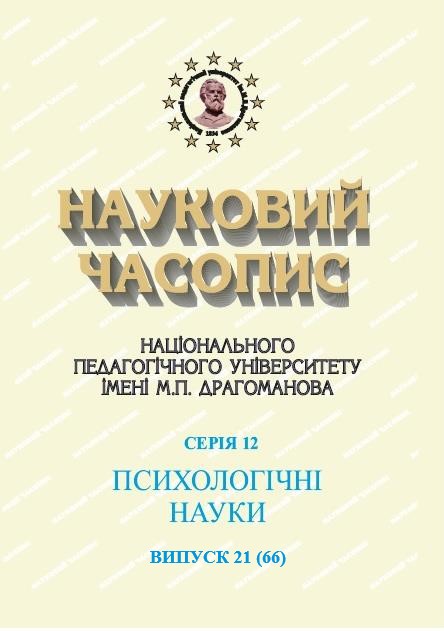PSYCHOLOGICAL FEATURES OF THE RELATIONSHIP BETWEEN HARDINESS AND LOCUS OF CONTROL IN PARTICIPANTS IN THE EDUCATIONAL PROCESS DURING THE WAR
DOI:
https://doi.org/10.31392/NPU-nc.series12.2023.21(66).07Keywords:
hardiness, locus of control, externality, internality, participants in the educational process.Abstract
The article is aimed at the determination of the psychological characteristics of the relationship between hardiness and the locus of control in the participants of the educational process during the war. The results of an empirical study are presented, in which the presence of a direct correlation between sustainability and internality has been revealed; subjective control; the internality of achievements and the style of industrial relations; control over action during planning; control over action during failure. An inverse correlation between externality and sustainability has been demonstrated. The article emphasizes that a person's locus of control determines the degree of their activity, in particular, the ability to show their own subjectivity or passivity. A personality with an internal locus of control is characterized by responsibility, the ability to make decisions independently, the ability to build interpersonal communication, quickly adapt to difficult life situations, and most importantly, to effectively carry out emotional self-regulation. It has been found that the internal locus of control is accompanied by the manifestation of the vitality of the individual, namely, it generates the ability to overcome difficulties, achieve set goals, provides awareness of inner strength and endurance, promotes the development of personal maturity, the desire to continue acquiring new knowledge, skills and abilities, provides the opportunity to be an active and purposeful subject of one's own life and development for a long time, and most importantly, provides the ability to remain calm under the pressure of failure, maintain mental health and general well-being. It has been determined that the internality of the individual’s achievements, correlating with vitality, has a positive effect on the acquisition of new academic achievements, namely, it motivates the individual to further develop and acquire knowledge, ensures the desire to learn new skills and abilities, even in difficult life situations of war. At the same time, it has been proven that the feeling of inability to influence the situation, lack of control has negative consequences, as it prevents the manifestation of vitality of the individual, the acquisition of positive experience, leads to passivity and irresponsibility, makes general development impossible, harms mental health and psychological well-being.
References
- Bazhin, E.F., Golynkina, E.A., & Etkind, A.M. (1993). Oprosnik urovnya subyektivnogo kontrolya (USK) [Subjective Control Level Questionnaire (SCQ)]. Smysl [in Russian].
- Kyrychenko, T. V. (2017). Lokus kontroliu yak mekhanizm rozvytku samorehuliatsii u maibutnikh uchyteliv [Locus of control as a mechanism for the development of self-regulation in future teachers]. Molodyi vchenyi – Young scientist , 6, 326–330 [in Ukrainian].
- Kotsan, I.Ya., Lozhkin, H.V., & Mushkevych, M.I. (2011). Psykholohiia zdorovia liudyny [Psychology of human health]. VNU im. Lesi Ukrainky [in Ukrainian].
- Kul, Yu. (n.d.). Opytuvalnyk «Shkala kontroliu za diieiu» (NAKEMR-90). Retrieved from https://kipt.sumdu.edu.ua/en/entrants/item/2479-opytuvalnyk-shkala-kontroliu-za-diieiu-nakemr90-yu-kul [in Ukrainian].
- Leontjev, D. (2007). Psihologija smysla: priroda, stroenie i dinamika smyslovoj realnosti. [Psychology of meaning: nature, structure and dynamics of meaning reality]. Smysl [in Russian].
- Lisova, L.I., & Saliuk, M.A. (2016). Kharakterystyky samoefektyvnosti ta lokusu kontroliu osobystosti yak predyktory stresostiikosti [Characteristics of self-efficacy and locus of control of personality as predictors of stress resistance.]. Naukovyi visnyk Khersonskoho derzhavnoho universytetu. Seriia «Psykholohichni nauky» – Scientifi c Bulletin of Kherson State University. Series “Psychological Sciences”, 1(1), 59–64 [in Ukrainian].
- Metodyka doslidzhennia lokusu kontroliu Rottera [Rotter’s locus of control research methodology]. (n.d.). Retrieved from http://psychologis.com.ua/oprosnik_rottera.htm [in Ukrainian].
- Opytuvalnyk rivnia subiektyvnoho kontroliu [Questionnaire of the level of subjective control]. (n.d.). Retrieved from http://personal.in.ua/article.php?Ida=186 [in Ukrainian].
- Test zhyttiestiikosti S. Maddi [S. Muddy hardiness test]. (n.d.). Retrieved from http://ni.biz.ua/1/1_5/1_51709_test-zhiznestoykosti-s-maddi.html [in Ukrainian].
- Kobasa, S.C., Maddi, S.R., & Kahn, S. (1982). Hardiness and health: a prospective study. Journal of personality and social psychology, 42(1), 168–177 https://doi.org/10.1037/0022-3514.42.1.168
- Rotter, J.B. (1982). Social learning theory. InExpectations and actions. (pp. 241-260). Routledge.

